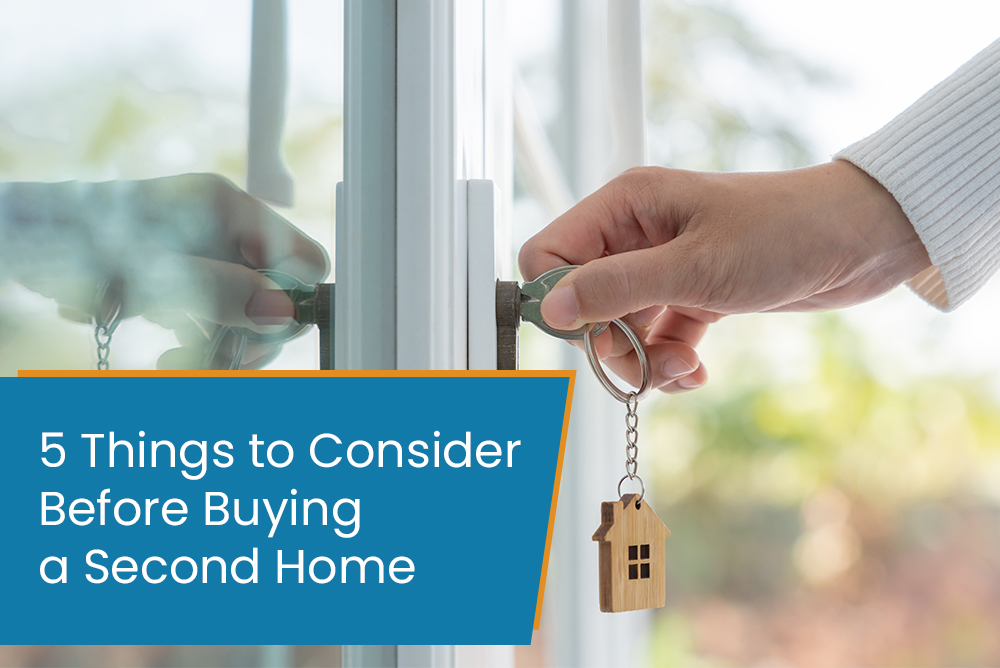
5 Things to Consider Before Buying a Second Home
Tags:
If you’re considering buying a second home in Ontario, you’re not alone. A recent survey concluded that more than 10% of Canadians have purchased a second home.
Participating in this growing trend is usually complicated if you don’t know the rules for second mortgages in Ontario. The good news is that you should consider only five main things before purchasing a second home.
In this post, we’ll explain these factors to help you make an informed purchase before choosing a lender.
1. Will You Use Your Primary Home’s Equity
Unless you have a high net worth, raising the capital to buy a second home will require a great deal of financial maneuvering. One way to raise the cash to buy a second home is by accessing the equity in your primary residence.
Suppose you plan on using your existing home equity to finance a second home. In that case, you should know that this process will involve a cash-out refinancing of your current home mortgage. Ultimately, you will have to take out a higher borrowed amount than before.
The upside of using your home equity to fund a second home is that you can bypass spending several years saving up toward the purchase. Also, depending on how much equity you have in your primary home, you can present a suitable financial profile to your lender to increase your chances of approval.
Make sure to speak to a mortgage professional to see if this choice is best for you.
2. Understand What Counts as a Second Home
Not every additional residential purchase counts as a “second home.” Typically, a second home refers to an owner-occupied property, at least for some time during the year. As a result, a second home could be a:
- Winter cottage for family get-togethers
- Summer vacation home
- Condo for long commutes to work
- An apartment complex that the owner lives in and rents to tenants
If you’re considering buying a second home in Ontario, your lender will mainly be concerned with whether or not you occupy the property. Lenders will classify it as an investment property if you don’t plan on living at the residence.
Some smaller lenders don’t provide mortgage loans for investment properties. Therefore, you should make this distinction early on before calling a mortgage lender.
3. Know the Rules
If you own a home, chances are you’re already familiar with the qualifying criteria for securing a home loan. This familiarity is because the requirements for owning a second or third home are similar to buying your primary residence.
These requirements are:
- You must qualify for a mortgage loan under the stress test
- You’ll need a good credit score for the lowest mortgage rates
- Borrowers must have an acceptable debt-to-income ratio with their lender
There is one difference you should be aware of, and that is the down payment. When you buy a primary residence, your down payment is tied into the total purchase price. However, buying an additional property means the following can affect your down payment amount:
- The size of the property
- The number of units the property has
- Whether or not the owner plans to live there
As you can see, the criteria for qualifying for a second home aren’t much different from your original purchase.
4. How Do You Plan to Finance
We’ve already covered that you can use the equity in your primary residence to fund the purchase of a second home. There is good news if you don’t have much home equity or want to assess other alternatives.
Buying a second home in Ontario can qualify you for the Insured Second Home Mortgage Program. Many Canadian homeowners enroll in this program and pay as little as 5% down for a property occupied by a family member going to college.
This program is also a popular alternative for purchasing a vacation home. Before enrolling in the Insured Second Home Mortgage Program, here are some things to keep in mind:
- The borrower must live in the property for some part of the year, or a family member can occupy the home. Under the guidelines of this program, you can’t charge a relative rent for occupying your home.
- The property you purchase must be accessible all year round. This factor means you’re responsible for winterizing your home and performing routine maintenance.
- Your second home must be located in Canada. You can’t use this program to buy timeshares or similar real estate.
5. Can You Afford a Second Home?
Understanding the rules of buying a second home in Ontario is very straightforward. Before any of that can matter, you must decide whether or not you can even afford the purchase.
A mortgage lender will evaluate your financial profile unless you have the funds to buy a second home outright. They will deeply examine your income, credit score, gross debt service (GDS) ratio, and total debt service (TDS) ratio.
Suppose you plan on buying a second home to add to your investment portfolio. In that case, your lender may count that anticipated revenue toward your gross income. This facet can substantially increase the amount you can borrow from a mortgage lender.
The most crucial aspect of affording a second home is the interest rate. An exorbitant interest rate could leave you stuck paying for a second home many years after you finish your first mortgage.
Ready to Take Out a Second Mortgage?
Buying a second home in Ontario is possible if your finances are in order and you agree to the purchase rules. Finding the right lender is crucial if you’re strongly considering making this choice.
At Canadalend.com, we help our customers thoroughly assess their options to take advantage of the most competitive mortgage rates. To learn more about our second mortgage and financing options, call Canadalend.com at 1-866-I CAN LEND or contact us here.